IT’S RUSH HOUR at Gold’s Gym in Venice, California. Athletes and musclemen and actors of all shapes are gathered for their Tuesday lift: curling, benching, posing, flexing, taking refuge from an unusually cold and rainy evening.
Over by the weight rack, aspiring actor/bodybuilder/real estate player Joseph Baena—Joe to his friends—is manhandling a couple massive dumbbells as an MH video crew jockeys for its best angle.
As the camera rolls, Baena wrestles the weights onto his lap, lies down on an incline bench, kicks the weights into position, and executes eight dumbbell presses with expert precision. “Go for a stretch at the bottom,” he instructs as he pumps the weights up and down. “Come all the way up and squeeze.”
The way he sells it, you’d almost believe that holding a few hundred pounds of steel over your face, then lowering and raising them until the fibers of your pectoral muscles feel like they’re going to separate from your sternum, is the most fun a guy can have on a drizzly evening in SoCal in late December 2021.
He’s a natural—at lifting weights, holding center stage, working an audience.
The setting is rich with history: Nicknamed the “mecca of bodybuilding,” Gold’s is the stomping and lifting and squatting ground for all the sport’s greats, made famous in 1977’s Pumping Iron, the semifictional documentary that set a young muscleman from Thal, Austria, on course to become the institution known as Arnold Schwarzenegger. The same guy whose massive, fading photo hovers on the wall, just above our heads.
The same guy who also happens to be the father of the man genially banging out dumbbell presses in front of me. If you’ve heard the name Joseph Baena, you probably know a bit about his history: how his mother, Guatemalan-born Mildred Baena, was the housekeeper for Arnold and his then wife, Maria Shriver, when Joseph was born in 1997. How his mother kept the truth of his paternity a secret throughout his childhood. And how, in 2011, when the resemblance between father and son became impossible to ignore, it came out publicly that Joseph was the child of one of the most famous and successful men on the planet. Mildred described exactly how her son found out his dad’s identity in an interview that year: “When [Joseph’s] grandmother sat him down to explain that Arnold Schwarzenegger was his father, he exclaimed, ‘Cool!’ ”
And then . . . silence. Baena and his mother declined to elaborate further on their radically transformed lives, leaving the public guessing about how he handled the sudden revelation. Until now. Over the four hours we spent talking about those turbulent times and his evolving relationship with his dad, it was clear that the trials of his first 24 years have forged a powerful sense of self. He’s proud of his Latino heritage, and he hopes people will see past his childhood and get to know and respect him for his own accomplishments as he crushes his day job selling houses at Aria Properties, a Marina del Rey real estate office, and establishes himself as an actor. First up is the action pic Lava, in which he has a lead role, and the low-budget sci-fi thriller Encounters is on the way. Hey, you gotta start somewhere.
Of course, people scoffed at Arnold when he started out—and then he became one of the highest-paid actors in Hollywood, living proof that ambition, faith, and unshakable confidence can take you pretty far. For many men, especially guys born in the ’70s, ’80s, and ’90s, Schwarzenegger has always loomed large as an exemplar of what’s possible if you work hard and make good on your talents and steadfastly refuse to take no for an answer. As inspiring as that life has been for many of us, it’s also a hell of a legacy to live up to—enough to deflate someone. In this, we’re all Baena’s brothers. Whatever alchemy of genes, upbringing, and training brought it on, Joseph Baena is wrestling through a condition that everyone from Sophocles to Shakespeare to Freud has told us is unavoidable. It’s right there in the scratchy, tinkling opening theme song to Pumping Iron: Every man wants to be bigger than Dad.
But what happens when an oversize picture of your dad towers over you on the wall of your gym—one of hundreds if not thousands of gyms in the L. A. area and an interesting choice of training (and interview) venue for a son who says he doesn’t want to live in his father’s shadow? Can anyone ever be bigger than this dad?
IT’S BEEN MORE than ten years since that day when all hell broke loose in his family, and those years have brought enough perspective that Baena’s now willing to open up about it. “Those are really big parts of my life that no one really knows,” he says.
Bakersfield, California, where Baena grew up with his mother and older siblings, is just 100 miles north of L. A.—but the suburban desert community, sometimes disparaged as the “armpit of California,” couldn’t be farther from the glitz of Hollywood. “It was a humble home, and we didn’t have much,” Baena says.
Still, the early years were happy: learning to cook with his mother (now a culinary-school graduate and a chef), speaking Spanish with his siblings (there are four on his mom’s side, ranging in age from 32 to 42), celebrating his Guatemalan heritage through food, culture, and music. “That’s a huge part of me,” he says. “My mom’s whole side is Guatemalan; we have a lot of Colombian family. Nearly everyone on that side is Latin American.” The music of Vicente Fernández plays—loudly—at every family gathering, where Mom’s take on tamales, baked in banana leaves instead of corn husks, is a favorite.
Into this period of relative tranquility, Baena recounts, the media frenzy came. “I remember the day very vividly,” he says. “I was in the eighth grade. Fifth or sixth period. And I get called out of class to leave. And my mom’s there, and she’s like, ‘We gotta go—everyone is finding out about you and who your father is.’ ” News trucks swarmed the house. Photographers hounded the family. “I’m 13,” he remembers. “Your body’s transforming; your mind is transforming. And now my life transformed before my eyes.”
Their home under siege, Mildred and Joe took a road trip, hiding out with relatives in Texas. Through it all—the probing eyes of the press, the ongoing pressure to stay incognito—mother and son stood strong: “She was really the only person I had, and I was really the only person that she had,” he says. “No one knew, and everyone wanted the details. We had each other’s backs.” (Baena declined to share exactly when he first talked to his dad after the revelation, and Schwarzenegger could not be reached for an interview.)
In his freshman year at Frontier High, Baena discovered that people looked at him differently: “The trust factor became really difficult.” He couldn’t tell who his friends were. Athletically inclined but chubby, he was cut from the basketball and soccer teams, and he considered giving up on sports.
The turning point came when his buddy Cesar tried to badger him into joining the swim team. Baena balked, worried about how he’d look in a Speedo. But Cesar was relentless, and swimming had one big advantage over the other sports: “There was no tryout,” he says. Baena’s long arms and powerful upper body engendered a fortuitous pairing of athlete and sport. “I was born for the water,” he says. Along with trophies, recognition, and a sleek physique came confidence, focus, and a new willingness to engage with fellow students; in his senior year, he was president of Frontier High. “That was a real honor,” he says—the first indication that he could thrive on his own and be a leader.
HANGING OUT WITH Baena, you notice quickly that his pronouncements practically overflow with positive hyperbole. Guatemalan food isn’t just good; it’s amazing. He is so fortunate to have had his college experience at Pepperdine University. Latino culture is so proud. He doesn’t drink much, and he barely curses—at one point, he even apologizes for using the word ass. If it sounds grating, however, it’s not—it’s endearing.
The unabating positivity is just one of many ways in which his bearing and behavior call to mind his father, and for a stranger who’s been a Schwarzenegger fan for decades, interacting with Baena is almost a time-traveling experience: One moment you forget whose son you’re talking to; the next, he’ll gesture widely with both arms—“I’m obsessed with schnitzel!”—and you’re watching Arnold plug The Terminator on The Tonight Show.
Baena is close with Schwarzenegger—photos of them socializing or exercising together are frequent media fodder—but he’s wary of talking about Dad too much. He does tell me, though, that they eventually bonded over fitness. Schwarzenegger gave Baena The Encyclopedia of Modern Bodybuilding (which he coauthored) to guide his training. “Even though I could call him anytime, I was too proud,” Baena says. “I went straight to the book. I wanted to figure it out myself.” Later, he reached out for tips on building his shoulders, and they started training together around his 18th birthday. Naturally, it involved a trip to Gold’s. “I was so nervous,” he says. But he took it all in—the rituals, the routines, and, perhaps most important, the demeanor. “I was being observant, trying to see what he was doing and the way he was acting,” says Baena. He learned to grip the bar on bench presses properly, turn his wrists on dumbbell curls, drop deep into the hole on squats. He learned to feel the stretch in his traps, the squeeze in his pecs, the deep burn in the muscles that signals growth.
Through it all, he developed an understanding that the gym—loud and rough-and-tumble though it is—can be a crucible for transformation. When he got serious about lifting in college, he says, “I was able to acquire a bodybuilding mentality—that I could shape my body however I want.” After having success as a swimmer, Baena found that with similar effort and discipline, he could build up, shred down, or do a combination of both. “I made insane progress,” he says of his college years.
His current regimen is, to say the least, involved: lots of sets, plenty of isolation moves, two hours, six days a week, plus 20 minutes of fasted cardio in the morning. “One of the big things I learned from Dad was not to have the ten-rep mentality,” he says. “It’s pushing yourself to the limits and going that extra mile, getting those extra reps and half reps till you’re basically dying.”
To the uninitiated, it sounds miserable, but Baena lights up as he talks about lifting. Research from the University of Missouri suggests that particular individuals may have an unusually high pleasure response to exercise, and Baena appears to be one of them. Though he stops short of equating it with sex (“as satisfying to me as coming,” Arnold once declared of lifting weights), he’s rhapsodic nonetheless: “Since I started working out seriously in college,” he says, “it was instant gratification.”
You might think, given his love of the gym and the genetic gifts lurking in his double helix, that Baena might feel pressure to jump into physique competitions. But he doesn’t. His saner, or maybe we should just say sane, attitude toward fitness ensures that his physique—six-foot-one and 190 pounds—while impressive, remains more approachable and athletic than that of most bodybuilders, more wide receiver than offensive lineman. His Instagram feed, @projoe2, which has a healthy but hardly A-list 351,000 followers, is more like a primer on living a happy life than an endless homage to bigorexia.
“There are so many other things that I care about more than fitness,” he says. “My lifestyle, my family, my friends, having fun at work. There’s a balance. It’s not just fitness all the time.”
It’s a blessedly un-Arnoldian sentiment.
With a new slew of actors getting Marvelized by the month, muscles are necessary for the types of roles Baena wants, but he knows that it takes more than that to scale the Hollywood sign. Given the shifting landscape of the entertainment industry, he was initially unsure how to proceed when he started considering acting as a career path.
“My dad is old-school; he doesn’t believe in handouts. He believes hard work pays off, and so do I,” says Baena. “I love the word honor, and I’m very prideful in the sense that if I use my dad’s contacts or ask him for favors, I wonder what honor is that gonna bring me?”
The same impulse drove his decision not to take a last name that might open doors for him in Hollywood: “When I go to auditions, they don’t know who I am, because we don’t have the same last name.” When he books a gig, he says, “I know it’s all me.”
DAD HAD THREE words of acting advice, Baena says: Do the reps.
The on-the-nose counsel struck Baena as funny at first. “I was like, Really? Like in workouts? What are you talking about?” With time and experience, however, he discovered the wisdom in Arnold’s simple directive. Acting can seem like alchemy—the magical act of becoming—but as with building your body, much of it is a Zen-like matter of putting in the hours. You have to get the shit done. If a scene requires 20 pages of dialogue, Baena says, “I say the lines over and over again—with a scene partner, an acting coach, or just by myself—repeating, repeating, repeating until it’s muscle memory. To a point where you can wash your clothes, do your dishes, basically do anything—and spit the lines out.” About as glamorous as lateral raises. But as in the gym, repetitive work is the price of success.
Another invaluable piece of Arnoldian guidance Baena took to heart: Find a mentor. Four years ago, while still in college, Baena reached out to Eric Morris, the storied acting coach who had guided Schwarzenegger to a Golden Globe for 1976’s Stay Hungry. As his father had a half century before, Baena hit it off with Morris, and he has worked with him three or four days a week ever since. “When Joseph first came to me, I called him Mr. Smiles-a-Lot,” says Morris, sharp and perceptive at 90. “That’s all he did onstage. Over time, though, he learned that it was okay to express his frustration, his anger, his vulnerability—he became more affectable and expressive.”
Baena admits that his early efforts in student films were clunky and self-conscious, but he found his stage legs in class two years ago playing Biff, the conflicted son of the title character, in Arthur Miller’s Death of a Salesman. Tearing up the ’40s-era dialogue—“Pop! I’m a dime a dozen, and so are you!”—he uncovered new depths of feeling and tapped into experiences from his life. The process helped him psychologically, too, he says, “almost like therapy.” “That was game changing for me,” he adds, noting that he was able to draw on the same intensity in Lava. “Getting that end of my range made me realize I can be a serious working actor,” he says. Morris is reluctant to compare elder to younger, but he’s enthusiastic about his student’s promise: “Joseph is on his own journey, with his own specific obstacles. He’s beautifully evolving. As he matures and gets more training, he’ll take on more complex roles.”
Asked where he sees himself in ten years, Baena doesn’t hesitate: “I’m an award-winning actor with lots of real estate experience, and I’m on a boat in Miami, sipping a mai tai with my buddies, getting ready for the next movie.” Okay, he’s got big dreams—he’s 24, after all.
Perhaps the real takeaway is that Baena is seemingly unafflicted by rage, resentment, or pathological ambition, the kind that sometimes derails the children of the famous. “It took a little bit for me to realize that I don’t have to do what my dad did,” he says. “I don’t have to get into acting or bodybuilding. I’m very motivated and driven. I’m happy about my relationship with my dad. But I’m more happy that I am finding joy in what I’m doing and that I’m doing exactly what I’ve always dreamed about.”
As he speaks, I think about all the men I know who have terrible relationships with their dads—abusive ones, remote ones, absent ones. And I think about Baena, together with his dad, cycling around Santa Monica, sharing a beer, working out at Gold’s, doing curls on the preacher bench. “A lot of guys struggle with trying to make their dad proud or trying to get out of their dad’s shadow. But as long as you’re doing what you want to do, then that all comes. Of course, maybe those guys don’t have such nice dads.”
If you shook a Magic 8-Ball to learn more about Baena’s next chapter—in fitness, in real estate, in the uncertain carnival ride that is the entertainment industry—you’d get a definitive Cannot predict now. But we like his chances.



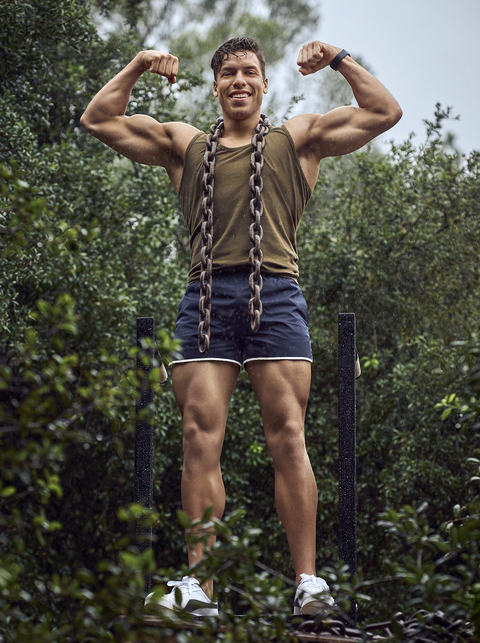

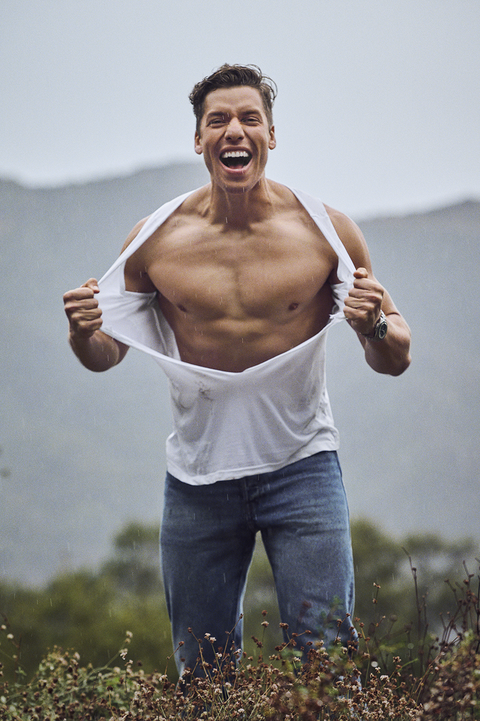

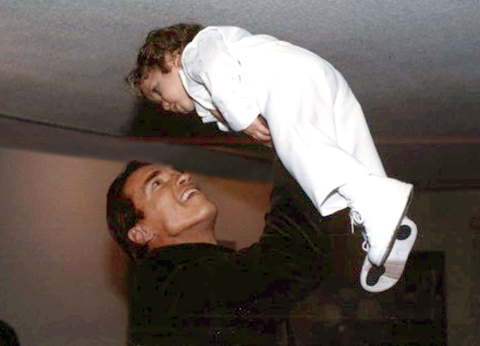
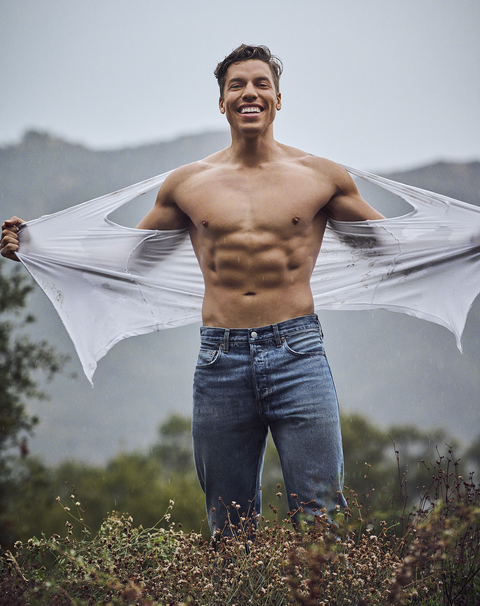

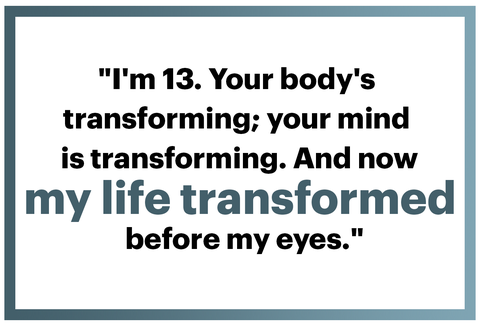
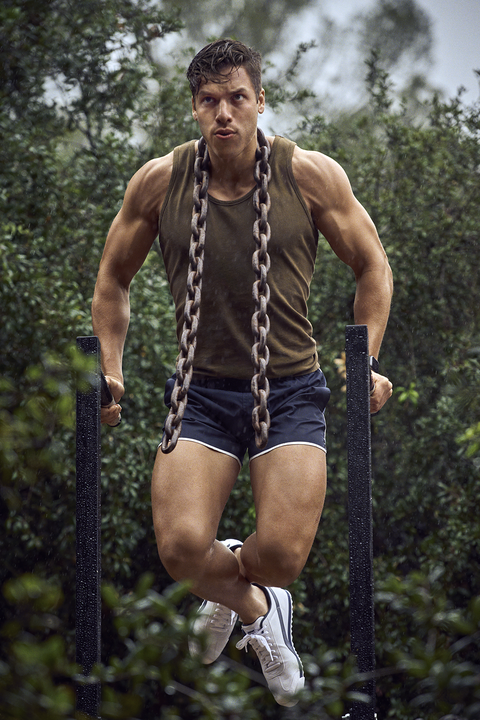
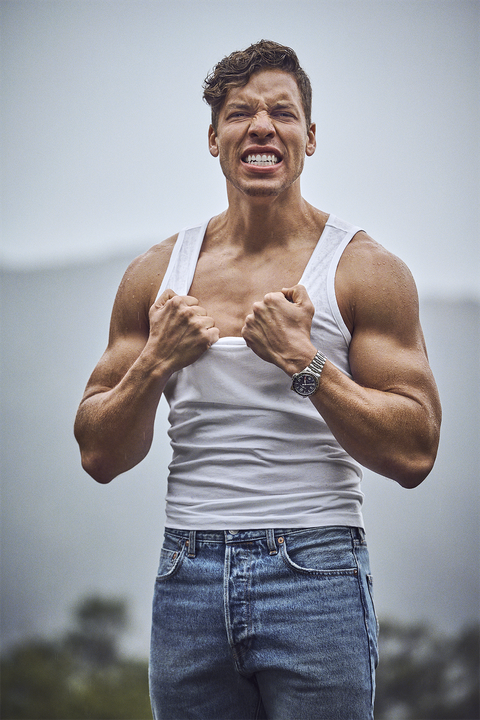
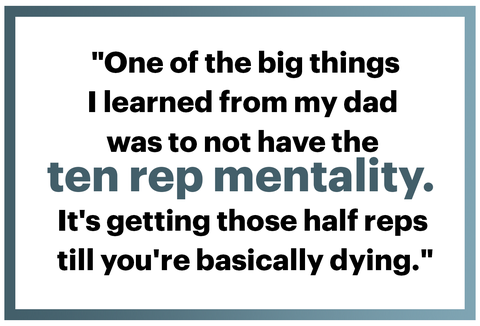
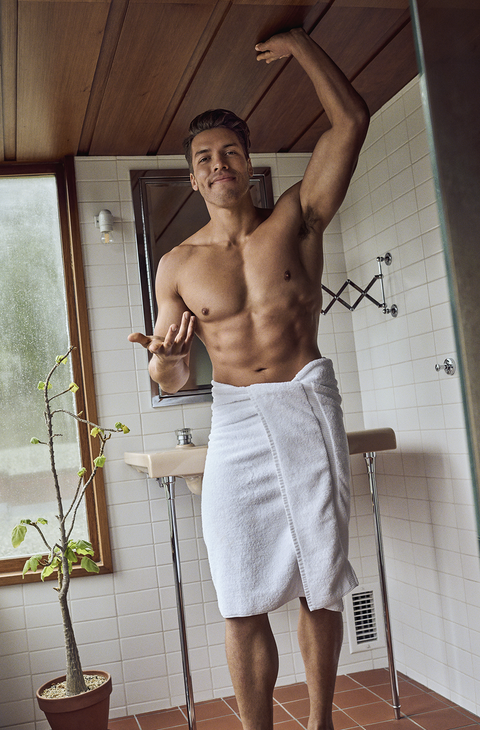
Comments are closed.